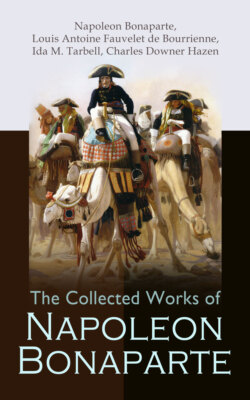Читать книгу The Collected Works of Napoleon Bonaparte - Charles Downer Hazen, Louis Antoine Fauvelet de Bourrienne - Страница 216
На сайте Литреса книга снята с продажи.
SERIES P
ОглавлениеNo. 1.
Written from Konigsberg (M. Masson, in Josephine Repudiée, says Dantzig; but on June 11th Napoleon writes to Eugène, "I shall be at Konigsberg to-morrow," where his correspondence is dated from henceforward). A day or two later he writes the King of Rome's governess that he trusts to hear soon that the fifteen months old child has cut his first four teeth.
No. 2.
Gumbinnen, June 20th.—From this place and on this date goes forth the first bulletin of the Grande Armée. It gives a résumé of the causes of the war, dating from the end of 1810, when English influence again gained ascendency.
On July 29th he writes Hortense from Witepsk to congratulate her on her eldest son's recovery from an illness. A week later he writes his librarian for some amusing novels—new ones for choice, or old ones that he has not read—or good memoirs.
Josephine meanwhile has permission to go to Italy. Owing to her grandson's illness she defers starting till July 16th. Through frightful weather she reaches Milan viâ Geneva on July 28th, and has a splendid reception. On the 29th she writes to Hortense: "I have found the three letters from Eugène, the last one dated the 13th; his health is excellent. He still pursues the Russians, without being able to overtake them. It is generally hoped the campaign may be a short one. May that hope be realised!" Two days later she announces the birth of Eugène's daughter Amelia, afterwards Empress of Brazil. Towards the end of August Josephine goes to Aix and meets the Queen of Spain with her sister Desirée Bernadotte, the former "kind and amiable as usual," the latter "very gracious to me"—rather a new experience. From Aix she goes to Prégny-la-Tour, on the Lake of Geneva, and shocks the good people in various ways, says M. Masson, especially by innuendoes against Napoleon; and he adds, "if one traces back to their source the worst calumnies against the morals of the Emperor, it is Josephine that one encounters there." She gets to Malmaison October 24th. Soon after his return from Moscow Napoleon pays her a visit, and about this time she begins to see the King of Rome, whose mother has always thought more of her daily music and drawing lessons than of whether she was making her son happy or not.
1812 closed in gloom, but 1813 was in itself terribly ominous to so superstitious a woman as Josephine. Thirteen is always unlucky, and moreover the numbers of 1813 add up to 13; also the doom-dealing year began on a Friday. Every one felt the hour approaching. As Napoleon said at St. Helena: "The star grew pale; I felt the reins slipping from my hand, and I could do no more. A thunderbolt could alone have saved us, and every day, by some new fatality or other, our chances diminished. Sinister designs began to creep in among us; fatigue and discouragement had won over the majority; my lieutenants became lax, clumsy, careless, and consequently unfortunate; they were no longer the men of the commencement of the Revolution, nor even of the time of my good fortune. The chief generals were sick of the war; I had gorged them too much with my high esteem, with too many honours and too much wealth. They had drunk from the cup of pleasure, and wished to enjoy peace at any price. The sacred fire was quenched."
Up to August Fortune had smiled again upon her favourite. With conscripts for infantry and without cavalry he had won Lutzen, Bautzen, and Dresden; and even so late as September Byron was writing that "bar epilepsy and the elements he would back Napoleon against the field." But treachery and incompetence had undermined the Empire, and Leipsic (that battle of giants, where 110,000 soldiers were killed and wounded) made final success hopeless. In 1814 his brothers Lucien and Louis rallied to him, and Hortense was for the only time proud of her husband. She thinks if he had shown less suspicion and she less pride they might have been happy after all. "My husband is a good Frenchman ... he is an honest man." Meanwhile, Talleyrand is watching to guide the coup de grâce. Napoleon makes a dash for Lorraine to gather his garrisons and cut off the enemy's supplies. The Allies hesitate and are about to follow him, as per the rules of war. Talleyrand, the only man who could ever divine Napoleon, sends them the message, "You can do everything, and you dare nothing; dare therefore once!" Hortense is the only man left in Paris, and in vain she tries to keep Marie Louise, whose presence would have stimulated the Parisians to hold the Allies at bay. It is in vain. Unlike Prussia or Austria who fought for months, or Spain who fought for years, after their capitals were taken:—
"Like Nineveh, Carthage, Babylon and Rome,
France yields to the conqueror, vanquished at home."
